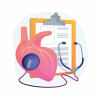Giving birth increases risk of heart disease and stroke

Chinese researchers have found that giving birth may increase a woman's risk of heart disease and stroke by 14 percent compared to having no children.
Carried out by researchers at Huazhong University of Science and Technology and Xi'an Medical University, the new study looked at ten studies from around the world involving a total of 3,089,929 women, of whom 150,512 developed heart disease or stroke during an average follow-up of 6 to 52 years.
The researchers found that there was a significant association between ever giving birth and the risk of cardiovascular disease, with women who had given birth showing a 14 percent higher chance of developing heart disease or stroke than those who had never given birth.
The findings, published in the European Journal of Preventive Cardiology, also revealed that each birth was associated with a four percent higher risk of developing cardiovascular disease, regardless of a woman's body mass index, diabetes, high blood pressure, smoking status, and income level, a 5 percent higher risk of coronary heart disease, and a 3 percent higher risk of stroke.
Although it is known that the heart works harder during pregnancy to meet the needs of the mother and fetus, it is still unclear what exactly causes pregnancy to impact a woman's future risk of heart disease.
"The mechanisms underlying the associations we observed are complex," said study author Dr Dongming Wang, "Pregnancy may lead to inflammation in the body, and the accumulation of fat around the abdomen, in the blood, and in the arteries. These changes could have permanent effects on the cardiovascular system, leading to a higher risk of heart and stroke later in life."
"Doctors have a role to play here," added Dr Wang. "Women should know that having children may raise their chance of future heart disease or stroke, and that more pregnancies could be increasingly risky. The good news is that there is a lot that women can do to prevent cardiovascular disease."
"Pregnancy is a good time to get rid of bad lifestyle habits. So quit smoking, exercise regularly, eat healthy food, and keep weight gain under control. Keep these habits after pregnancy, get more exercise to reduce abdominal fat, and watch the fat content in your diet to keep blood lipids at a healthy level."
A study carried out by UK and US researchers published last month also found that women who experience pregnancy loss and do not go on to have children showed a 64 percent higher risk of coronary heart disease and 46 percent higher risk of heart failure compared to women with one or two children. In addition, women who had given birth to five or more children also had a 38 percent higher risk of having a serious heart attack.

 For all latest news, follow The Daily Star's Google News channel.
For all latest news, follow The Daily Star's Google News channel. 








Comments